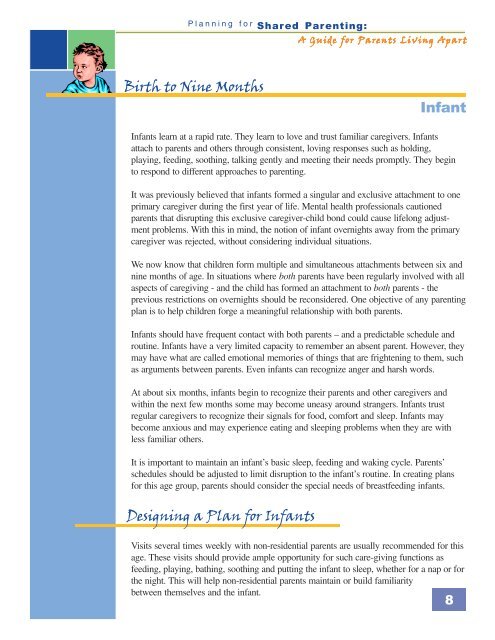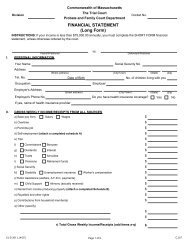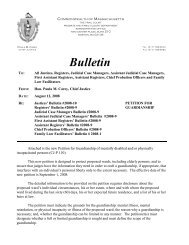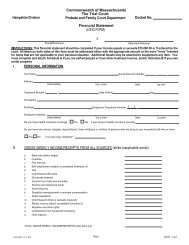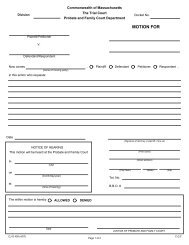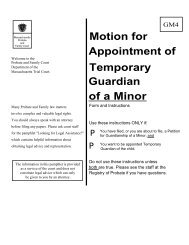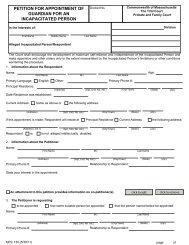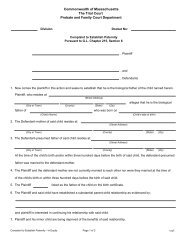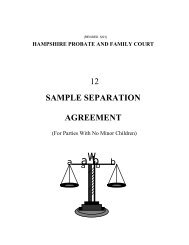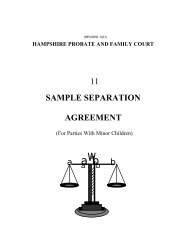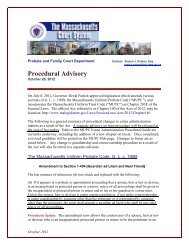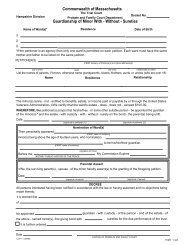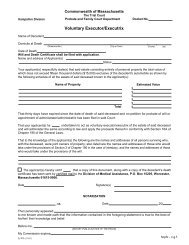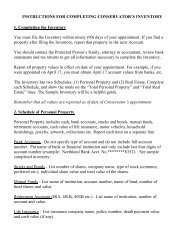Planning for Shared Parenting - Mass.Gov
Planning for Shared Parenting - Mass.Gov
Planning for Shared Parenting - Mass.Gov
You also want an ePaper? Increase the reach of your titles
YUMPU automatically turns print PDFs into web optimized ePapers that Google loves.
<strong>Planning</strong> <strong>for</strong><strong>Shared</strong> <strong>Parenting</strong>:A Guide <strong>for</strong> Parents Living ApartBirth to Nine MonthsInfantInfants learn at a rapid rate. They learn to love and trust familiar caregivers. Infantsattach to parents and others through consistent, loving responses such as holding,playing, feeding, soothing, talking gently and meeting their needs promptly. They beginto respond to different approaches to parenting.It was previously believed that infants <strong>for</strong>med a singular and exclusive attachment to oneprimary caregiver during the first year of life. Mental health professionals cautionedparents that disrupting this exclusive caregiver-child bond could cause lifelong adjustmentproblems. With this in mind, the notion of infant overnights away from the primarycaregiver was rejected, without considering individual situations.We now know that children <strong>for</strong>m multiple and simultaneous attachments between six andnine months of age. In situations where both parents have been regularly involved with allaspects of caregiving - and the child has <strong>for</strong>med an attachment to both parents - theprevious restrictions on overnights should be reconsidered. One objective of any parentingplan is to help children <strong>for</strong>ge a meaningful relationship with both parents.Infants should have frequent contact with both parents – and a predictable schedule androutine. Infants have a very limited capacity to remember an absent parent. However, theymay have what are called emotional memories of things that are frightening to them, suchas arguments between parents. Even infants can recognize anger and harsh words.At about six months, infants begin to recognize their parents and other caregivers andwithin the next few months some may become uneasy around strangers. Infants trustregular caregivers to recognize their signals <strong>for</strong> food, com<strong>for</strong>t and sleep. Infants maybecome anxious and may experience eating and sleeping problems when they are withless familiar others.It is important to maintain an infant’s basic sleep, feeding and waking cycle. Parents’schedules should be adjusted to limit disruption to the infant’s routine. In creating plans<strong>for</strong> this age group, parents should consider the special needs of breastfeeding infants.Designing a Plan <strong>for</strong> InfantsVisits several times weekly with non-residential parents are usually recommended <strong>for</strong> thisage. These visits should provide ample opportunity <strong>for</strong> such care-giving functions asfeeding, playing, bathing, soothing and putting the infant to sleep, whether <strong>for</strong> a nap or <strong>for</strong>the night. This will help non-residential parents maintain or build familiaritybetween themselves and the infant.8


